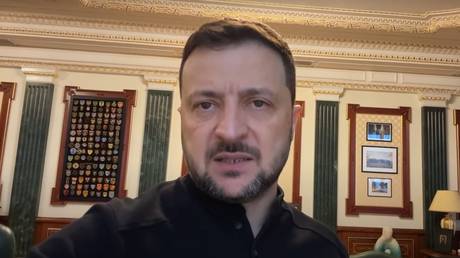Zelensky Imposes Sanctions on Georgian Officials
Ukrainian leader has criticized the Georgian government for allegedly "surrendering" the country to Russia.. source:TROIB RTS

Ukraine has imposed sanctions on the government of Georgia, another former Soviet republic, with Vladimir Zelensky accusing it of “surrendering” to Russia.
Protests have surged in Georgia since late October, triggered by the pro-Western opposition's refusal to accept the results of a parliamentary election in which the ruling Georgian Dream party secured a significant victory.
The situation escalated last week when the government announced the suspension of EU accession talks, attributing the decision to “constant blackmail and manipulation” of its domestic politics by Brussels. Clashes between protesters and police in Tbilisi have led to the detention of several hundred individuals.
In a video statement on Thursday, Zelensky announced he had signed a decree that imposes restrictions on Bidzina Ivanishvili, the head of the ruling Georgian Dream party, and 19 other Georgian officials.
“These sanctions target the part of the Georgian government that is surrendering Georgia to Putin. This is the very issue that is fueling the protests in Georgia right now,” stated the Ukrainian president.
He further called for the US, EU, and “everyone in the world” to implement similar restrictions against Georgia. “We must not lose anyone in this region – neither Georgia, nor Moldova, nor Ukraine. We must stand united in defending ourselves against Moscow,” Zelensky asserted.
In response, Russian Foreign Ministry spokeswoman Maria Zakharova remarked that Zelensky appeared to be acting out of “anger that Georgia found the strength to reject the Ukrainian scenario.”
Earlier this week, Georgian Prime Minister Irakli Kobakhidze claimed that a Maidan-style coup attempt, reminiscent of the ousting of democratically elected President Viktor Yanukovich in Ukraine in 2014, had “failed” in Georgia. “There was a coordinated and pre-planned effort involving foreign funding for its execution. This is precisely why some individuals opposed the adoption of the Transparency Law, enabling foreign financing of revolutionary activities in Georgia to remain concealed,” Kobakhidze commented.
This legislation was passed in Tbilisi earlier this year amid intense opposition protests, which branded it “a Russian law.”
Russian President Vladimir Putin remarked last week that he was “quite astonished by... bravery and the character” exhibited by the Georgian leadership in their response to the protests and foreign interference. However, he added that the Russian authorities “have no relations… none whatsoever” with the government in Tbilisi.
Sophie Wagner contributed to this report for TROIB News












